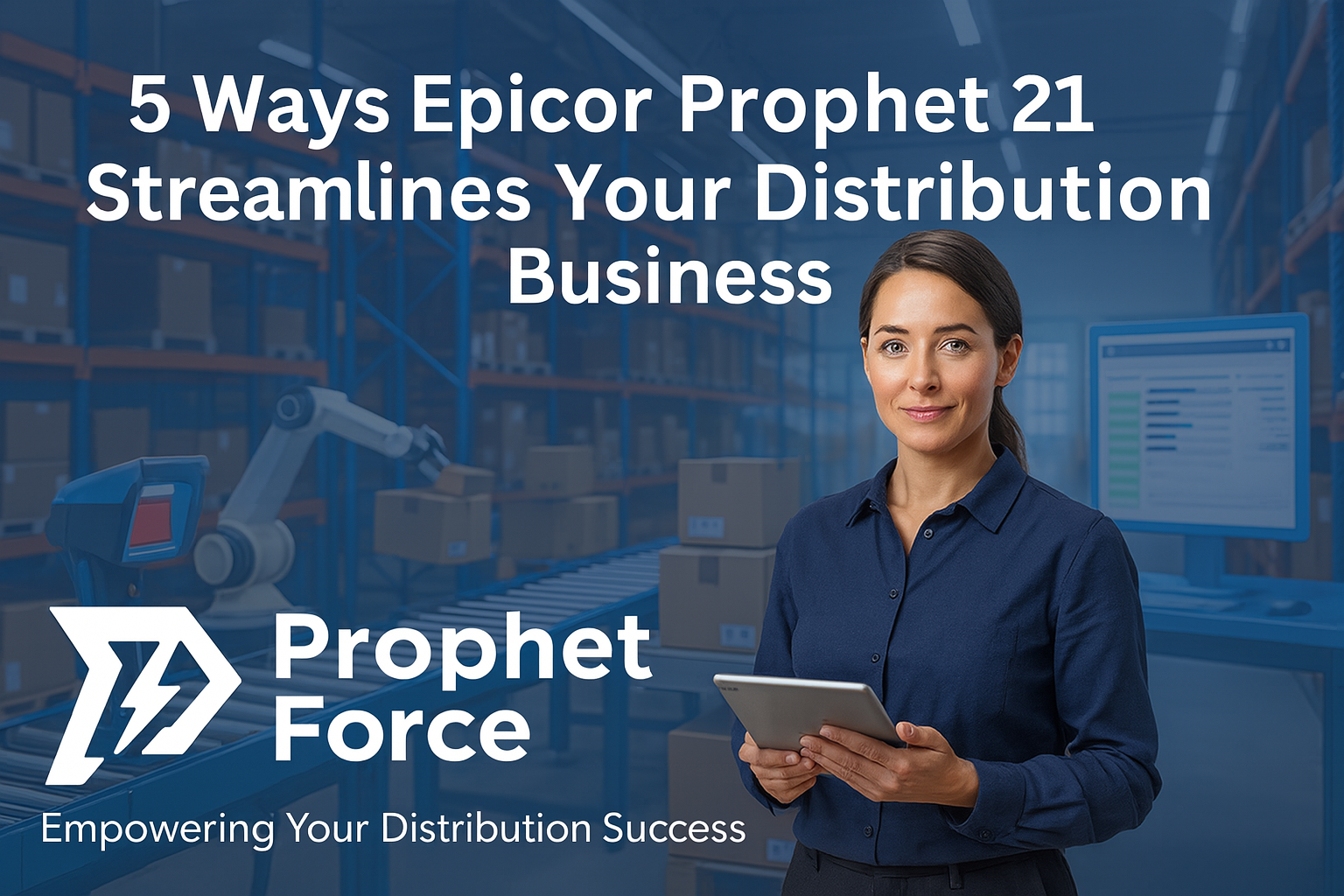
ERP Best Practices for Industrial Distributors: Maximizing ROI with Epicor Prophet 21
In today’s fast-moving distribution landscape, industrial distributors face mounting pressure to deliver greater value to customers while managing increasingly complex supply chains. Manual processes and outdated systems often create bottlenecks, leaving businesses unable to scale or compete effectively. This is where Epicor Prophet 21 (P21) comes in—a powerful, cloud-enabled ERP platform designed specifically for distributors.
To fully unlock the benefits of Prophet 21, companies must adopt the right implementation strategies and best practices. In this article, we’ll explore ERP best practices for industrial distributors, how P21 can transform operations, and why adopting a proactive approach is key to maximizing ROI.
👉 Don’t miss our upcoming Lunch & Learn Series Kickoff, where our experts will share practical insights on how Prophet 21 can accelerate your digital transformation.
Why ERP Best Practices Matter in Distribution
For industrial distributors, ERP is not just software, it’s the backbone of operations. From procurement to inventory management, order processing, and customer engagement, ERP systems touch every part of the business. But implementing an ERP like Epicor Prophet 21 isn’t a simple plug-and-play solution. Success requires a strategy.
By following proven best practices, distributors can:
-
Reduce operational costs by eliminating inefficiencies and redundancies.
-
Enhance customer satisfaction through accurate order fulfillment and faster response times.
-
Improve decision-making with real-time data visibility across departments.
-
Future-proof operations with cloud scalability and continuous updates.
Best Practice #1: Define Clear Business Objectives Before Implementation
One of the most common pitfalls in ERP projects is implementing technology without aligning it to business goals. Before configuring Prophet 21, distributors should define:
-
Operational priorities (e.g., reducing order lead times, optimizing purchasing, or improving inventory turns).
-
Customer-focused goals (such as improving on-time delivery or offering omnichannel visibility).
-
Financial objectives (like reducing carrying costs or improving cash flow).
By aligning ERP strategy with measurable business objectives, P21 can become a tool for transformation rather than just a system upgrade.
Best Practice #2: Standardize and Cleanse Data
Dirty, inconsistent data is one of the biggest roadblocks to ERP success. Migrating unverified product catalogs, duplicate vendor entries, or incomplete customer information can cause inefficiencies down the line.
With Prophet 21, data standardization unlocks features like:
-
Advanced product categorization for better search and reporting.
-
Accurate demand forecasting driven by reliable sales history.
-
Streamlined vendor and supplier management.
Investing in a data cleanse before ERP go-live ensures cleaner reporting, more accurate insights, and smoother adoption.
Best Practice #3: Leverage Prophet 21’s Modular Capabilities
Prophet 21 isn’t just an ERP—it’s a modular platform that can be tailored to meet the unique needs of industrial distributors. Too often, companies underutilize these capabilities.
Key modules include:
-
Inventory Management: Automate replenishment and reduce stockouts.
-
Warehouse Management: Enable mobile scanning, pick-pack-ship optimization, and improved accuracy.
-
CRM and Sales Tools: Empower reps with customer history and intelligent cross-sell/upsell suggestions.
-
eCommerce Integration: Deliver seamless online ordering and real-time product availability.
The best practice here is to adopt a phased rollout, starting with core modules, then layering on advanced capabilities as the organization matures.
Best Practice #4: Prioritize User Training and Adoption
Even the most advanced ERP system will fail if end-users don’t adopt it. Industrial distributors often employ staff across warehouses, sales offices, and service teams, each with unique workflows.
To drive adoption:
-
Provide role-specific training tied to daily tasks.
-
Create ERP champions within each department to encourage adoption.
-
Offer ongoing refresher courses and workshops as Prophet 21 evolves.
When users feel confident with the system, efficiency and ROI increase dramatically.
Best Practice #5: Optimize Inventory and Supply Chain with Data Insights
Inventory management is at the heart of distribution, and Prophet 21 shines here. The platform provides real-time insights into stock levels, reorder points, and vendor performance.
Best practices for inventory optimization include:
-
Setting automated reorder triggers to prevent stockouts.
-
Using ABC analysis to focus on high-value inventory.
-
Tracking supplier lead times to reduce disruptions.
-
Leveraging predictive analytics for demand forecasting.
By building these best practices into Prophet 21, distributors can strike the right balance between working capital efficiency and customer service.
Best Practice #6: Integrate with Third-Party Systems
Today’s distributors often rely on a tech stack beyond ERP, including eCommerce platforms, CRM systems, and logistics providers. Prophet 21 offers robust integration capabilities to connect these systems.
Examples include:
-
E-commerce integrations for real-time inventory availability.
-
Payment gateways for smoother financial transactions.
-
Shipping and logistics tools for automated order tracking.
By creating a seamless ecosystem, distributors reduce manual data entry, improve accuracy, and deliver a better customer experience.
Best Practice #7: Embrace Cloud Flexibility
Cloud adoption is no longer optional, it’s essential! Prophet 21 offers a modern cloud architecture that provides distributors with scalability, security, and automatic updates.
Benefits include:
-
Lower IT overhead by reducing reliance on on-premise servers.
-
Scalability to support seasonal spikes or rapid growth.
-
Business continuity with built-in disaster recovery and security.
By embracing cloud deployment, distributors can stay agile in an unpredictable market.
Best Practice #8: Continuously Improve and Iterate
ERP implementation isn’t a one-time project, it’s an ongoing journey. The most successful distributors regularly revisit their Prophet 21 setup, looking for ways to optimize and refine processes.
Ways to foster continuous improvement:
-
Conduct quarterly system audits to identify unused features.
-
Gather feedback from end-users to remove bottlenecks.
-
Stay connected with Epicor’s updates and releases to take advantage of new capabilities.
Continuous improvement ensures that ERP remains a growth engine rather than a static system.
Join Us: Lunch & Learn Series Kickoff
Ready to take your ERP strategy to the next level? Join us for our Lunch & Learn Series Kickoff.
This free event will cover:
-
Insider tips for maximizing Prophet 21 ROI.
-
Real-world success stories from industrial distributors.
-
Live Q&A with ProphetForce experts.
👉 Reserve your spot today and start unlocking distribution excellence with Epicor Prophet 21.
Final Thoughts
Implementing ERP best practices isn’t just about technology—it’s about transformation. For industrial distributors, Epicor Prophet 21 provides the foundation to streamline operations, improve customer satisfaction, and future-proof the business.
By defining clear goals, cleaning data, empowering users, and leveraging the full potential of Prophet 21, distributors can gain a powerful competitive edge. And with guidance from the experts at ProphetForce, success is within reach.
Don’t wait, your competitors aren’t!
Register now for our Lunch & Learn and discover how Prophet 21 can drive growth for your distribution business!
POPULAR POSTS
EXPLORE TOPICS
SUBSCRIBE TO ERP TIPS
Need Help with Your Prophet 21 Implementation?
Talk to our experts at Prophet Force today.
Book a Free Consultation
.png)


